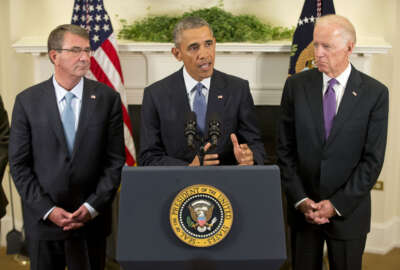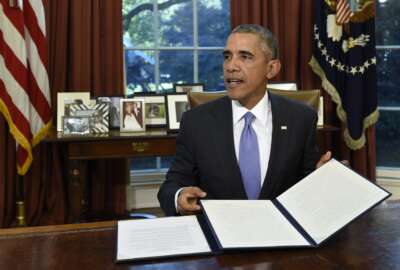
DoD working around $17 billion deficit for 2017
The two-year budget deal agreed to by Congress has left DoD in a hole for its 2017 budget planning.
The Defense Department has a $17 billion deficit it is dealing with for fiscal 2017, partly exacerbated by President Barack Obama’s decision this fall to keep more troops in Afghanistan.
Deputy Defense Secretary Bob Work said there is a $14 billion deficit between the two-year budget deal Congress passed at the end of October and the President’s 2017 defense budget request.
The extra $3 billion comes from the decision to keep 5,500 troops in Afghanistan through 2017.
Work told reporters during his visit to Halifax, Canada this weekend that DoD was in the “end-game” of 2017 budget planning.
“We’ve made all our programmatic decisions — our big programmatic decisions,” Work said in a transcript of the exchange with reporters.
Work said he plans to sit down with the Office of Management and Budget on Dec. 4 and hopes to have everything locked down by Dec. 18. At that point, everything will be turned over to the budgeters, he said.
Work said DoD needs to “come to grips” on military compensation and determine what the size of the military pay raise will be, and what DoD will do about health care. He said that issue would be resolved by Dec. 2.
The 2016 Defense authorization bill includes a 1.3 percent increase in pay for the military, which will go into effect Jan. 1.
Work said that DoD is taking into account fuel prices and inflation numbers, which were delivered to Work on Nov. 20.
“That’s very important for us because that can either be an asset that frees up money for program, or it could be a cost and take money away from program,” Work said.
Another issue DoD will have to resolve is how much it will spend on its military assets in Europe. Congress gave DoD $1 billion in 2015 to “reassure” allies against Russian aggression. The President requested a little more than three-quarters of a billion dollars for 2016.
Work said decisions on the European Reassurance Initiative will also be solved on Dec. 2.
DoD has a lot to think about after Turkey shot down a Russian military plane on Nov. 24. Turkey is a part of NATO and therefore the United States is obligated to back the country. Also factored into that decision is how much more the department wants to invest in counterterrorism.
The two-year budget deal passed by Congress gives DoD $551 billion in base budget funding and $59 billion in overseas contingency operations (OCO) funding — a total of $610 billion for 2017.
OCO funding is used for emergency operations; however, recently it has been used as a relief valve by Congress to pay for base budget items without triggering sequestration.
The 2016 Defense authorization bill approves $607 billion for DoD, $5 billion less than expected. Congress originally planned to give DoD $612 billion in 2016 and used OCO as a means of avoiding sequestration.
Obama vetoed that bill on the grounds that it increased defense spending without upping domestic spending and did not solve the sequestration problem.
After the budget deal was passed Congress had to cut some increases it made to the President’s defense budget request to get to $607 billion.
Copyright © 2025 Federal News Network. All rights reserved. This website is not intended for users located within the European Economic Area.
Scott Maucione is a defense reporter for Federal News Network and reports on human capital, workforce and the Defense Department at-large.
Follow @smaucioneWFED





